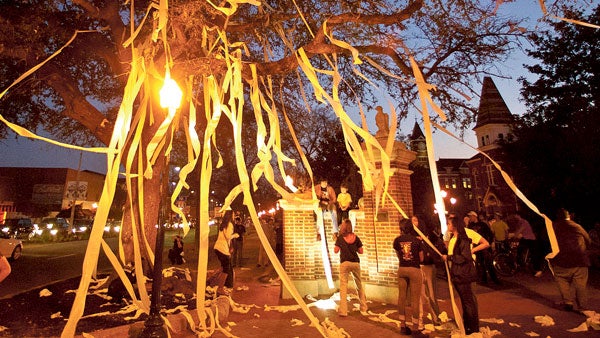A classless act committed at Auburn
Published 10:41 pm Wednesday, February 16, 2011

Vasha Hunt | Opelika-Auburn News Auburn University students, fans and residents gathered Wednesday for an impromptu rolling of the famous Toomers Corner oak trees, after hearing reports that persons unknown had poisoned the trees, and that the life expectancy of the trees could be a year or less. The trees are ofter rolled after major Auburn athletic victories. -- Submitted photo
By Natalie Nettles
The Alexander City Outlook
AUBURN — Auburn University confirmed Wednesday a herbicide commonly used to kill trees was deliberately applied in lethal amounts to the soil around the Toomer’s Corner live oaks on the Auburn campus.
The confirmation comes three weeks after a caller identified as “Al from Dadeville” phoned The Paul Finebaum Show claiming he had applied the herbicide.
The caller, who phoned the nationally syndicated radio show based in Birmingham Jan. 27, expressed disdain toward Auburn University, claiming he had a copy of a newspaper that showed Auburn students rolling Toomer’s Corner following former Alabama coach Paul “Bear” Bryant’s death. The caller also said he attended the Iron Bowl this past year and saw a “Scam Newton” jersey placed on Bryant’s statue on campus.
“Well let me tell you what I did,” the caller said. “The weekend after the Iron Bowl I went to Auburn, Ala. because I live 30 minutes away and I poisoned the Toomer’s trees. I put Spike 80DF in them … they’re not dead yet but they definitely will die.”
Finebaum asked the caller if it was against the law to poison a tree, to which he replied, “Do you think I care? … I really don’t” before signing off with “Roll Damn Tide.”
The university soon learned about the call and, as a precaution, soil samples were taken the next day and sent to the Alabama State Pesticide Residue Laboratory on campus for analysis. Due to a small fire that occurred in the Alabama lab in December, the tests were sent to the lab at Mississippi State University in Starkville, Miss. to expedite results, according to a press release issued by the university on Wednesday.
The lowest amount of Spike 80DF detected was 0.78 parts per million, which horticulture experts describe as a “very lethal dose.” The highest amount detected was 51 parts per million, or 65 times the lowest dose.
Experts believe a normal application by itself would have been enough to kill the trees, which are estimated to be more than 130 years old.
According to the university press release, there is “little chance to save the trees.”
“We are assessing the extent of the damage and proceeding as if we have a chance to save the trees,” said Gary Keever, an Auburn University professor of horticulture and a member of Auburn’s Tree Preservation Committee. “We are also focused on protecting the other trees and shrubs in Samford Park. At this level the impact could be much greater than just the oaks on the corner, as Spike moves through the soil to a wide area.” Additional tests are being completed to determine the movement and extent of the area affected, Keever said. The removal process involves digging trenches and applying activated charcoal to absorb the herbicide from the soil and block its progress. A representative from Dow Chemical, which manufactures the herbicide, is advising the university on removal procedures, and expert horticulturalists are also being consulted.
“We will take every step we can to save the Toomer’s oaks, which have been the home of countless celebrations and a symbol of the Auburn spirit for generations of Auburn students, fans, alumni and the community,” said Auburn president Jay Gogue.
Gogue asked members of the Auburn Family to “continue to be ‘All In’ in upholding its reputation for class” and not allow anger to be expressed inappropriately or undeservedly.
“It is understandable to feel outrage in reaction to a malicious act of vandalism,” he said. “However, we should live up to the example we set in becoming national champions and the beliefs expressed in our Auburn Creed. Individuals act alone, not on behalf of anyone or any place, and all universities are vulnerable to and condemn such reprehensible acts.”
The City of Auburn Police Department is investigating. Also, the application of Spike 80DF, or tebuthiuron, is governed by state agricultural laws and the Environmental Protection Agency, according to the university’s release. The university does not use Spike herbicide. There is no reason to suspect any human danger from the herbicide, which manufacturer Dow Chemical says should be applied with proper clothing protection; a typical use of the herbicide is to kill trees along fence lines.
Calls to the Auburn Police Department were not returned by press time Wednesday.
More information and ongoing updates as to treatment and prognosis are available at www.auburn.edu/oaks. Anyone with information can contact the Auburn Police Division at (334) 501-3110 or anonymously by voice or text on the tip line at (334) 246-1391.





